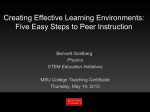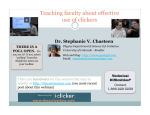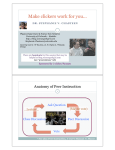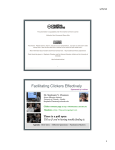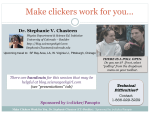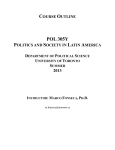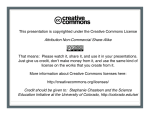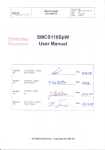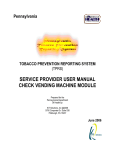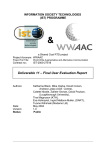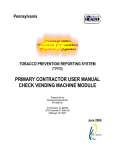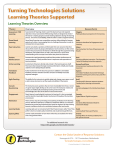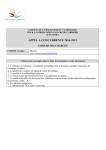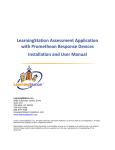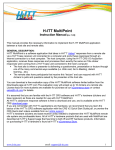Download FTEP-question-writin.. - University of Colorado Boulder
Transcript
The Gentle Art of Questioning WRITING GREAT CLICKER QUESTIONS Dr. Stephanie V. Chasteen Physics Department & Science Education Initiative Univ. of Colorado at Boulder http://colorado.edu/sei Web and blog: http://sciencegeekgirl.com Email: [email protected] This presentation is copyrighted under the Creative Commons License Attribution Non-Commercial Share-Alike That means: Please watch it, share it, and use it in your presentations. Just give us credit, don’t make money from it, and use the same kind of license on the works that you create from it. More information about Creative Commons licenses here: http://creativecommons.org/licenses/ Credit should be given to: Stephanie Chasteen and the Science Education Initiative at the University of Colorado, http://colorado.edu/sei Who are you? " Show of hands A. Natural sciences B. Social sciences C. Humanities D. Arts E. Languages F. Other Have you used response systems (clickers) in your teaching? " Take a clicker & turn it on " If the green light flashes, your vote has been counted A. Not at all, and I haven’t seen them used B. Not at all, but I’ve observed their use somewhat C. I’ve used them a little D. I’ve used them a lot E. I could be (should be?) giving this workshop How familiar are you with Mazur’s “Peer Instruction” " Colored cards A. Fairly familiar, and I like it B. Fairly familiar, but I’m not sure that I like it C. I’ve heard of it but only have a vague idea what it is D. Not familiar at all E. Not sure Introducing Me 6 Science Education Initiative http://colorado.edu/SEI Applying scientific principles to improve science education – What are students learning, and which instructional approaches improve learning? Physics Education Research Group http://PER.colorado.edu One of largest PER groups in nation, studying technology, attitudes, classroom practice, & institutional change. Blogger http://blog.sciencegeekgirl.com Why question? 7 Credit: Rosie Piller whiteboard Agenda 8 1. When and how we can ask questions 2. About clickers as a way to ask questions, 3. Writing good questions. Example questions, writing our own. 4. Action plan Learning goals: Participants will be able to…. A. Explain several benefits of questioning and of using clickers to question B. Defend the use of best practices in questioning to overcome common challenges C. Formulate and revise clicker questions to target student learning goals Exercise #1: Question goal brainstorm 9 What goals might clickers be used to achieve? Or, put another way, what might you use clicker questions to accomplish in your class? Brainstorm in your handout, then we will discuss as a group. 2 minutes whiteboard Some of my question goals 10 BEFORE Setting up instruction Motivate Discover Predict outcome Provoke thinking Assess prior knowledge AFTER Assessing learning Relate to big picture Demonstrate success Review or recap Exit poll DURING Developing knowledge Check knowledge Application Analysis Evaluation Synthesis Exercise skill Elicit misconception Credit: Rosie Piller and Ian Beatty. Clickers are a tool for questioning 11 Don’t confuse the pedagogy with the technology! But not a magic bullet! The perfect question doesn’t solve all problems! Why use clickers to target the class? An outline of Peer Instruction. 12 A quick outline of peer instruction 13 Anatomy of Peer Instruction 14 Ask Question (Maybe vote) …Lecture… Class Discussion Peer Discussion Vote * See also: Peer Instruction, A User’s Manual. E. Mazur. What is special about clicker questions? 15 Similar in terms of goals Multiple choice Anonymous (to peers) Every student has a voice – the loud ones and the shy ones Forced wait time You can withhold the answer until everyone has had time to think (choose when to show the histogram) What does this tool help us to do? Which of these could be clicker questions? 16 BEFORE Setting up instruction Motivate Discover Predict outcome Provoke thinking Assess prior knowledge AFTER Assessing learning Relate to big picture Demonstrate success Review or recap Exit poll DURING Developing knowledge Check knowledge Application Analysis Evaluation Synthesis Exercise skill Elicit misconception Credit: Rosie Piller and Ian Beatty. Let’s try it 17 Which superpower would you rather have? The ability to… A. Change the mass of things B. Change the charge of things C. Change the magnetization of things D. Change the boiling point of things What is the goal of this question? When might you use it? 17 Question: Ian Beatty, UNC Greensboro Image: Thibault fr on Wikimedia Example question: Ethics If you were a judge, how would you assess the “responsibility” of the U.S. Government, for what happened in the world between 1933 and 1945? A. Not responsible B. Minimally responsible C. Responsible D. Very responsible What is the goal of this question? When might you use it? Origin unknown 18 Example question: Math Your sister in law calls to say that she’s having twins. Which of the following is the most likely? (Assume she’s having fraternal, not identical, twins) A. B. C. D. Twin boys Twin girls One girl and one boy All are equally likely What is the goal of this question? When might you use it? 19 Derek Bruff, Vanderbilt Example question: Literature If Homer wrote the Iliad today, Stanley Fish and Harold Bloom would argue, respectively, whether the work should be categorized as: A. Existential vs. Romantic B. Postmodern vs Classical C. Modern vs Romantic D. Postcolonial vs Modern E. Preliterate vs Postliterate Origin unknown What is the goal of this question? When might you use it? The Technology Enhanced Learning and Research center at Ohio State Questions? 21 Ask Question (Maybe vote) …Lecture… Class Discussion Peer Discussion Vote * See also: Peer Instruction, A User’s Manual. E. Mazur. Exercise #2: Try writing a question Choose one of the question goals (slide #3 on page 2 in handouts) Write a draft question that aims to achieve this goal. 3 minutes Question-writing tips Move away from simple quizzes Use questions that prompt discussion Use questions that emphasize reasoning or process Use clear wording Use tempting distracters Use questions at a mixture of cognitive depth Ask challenging questions – don’t just test memorized facts See handout Effective multiple-choice questions have believable “distracters.” 1) Talking with other instructors that have taught the course in the past. 2) Talking with your students one-on-one before class, after class, during office hours. 3) Using student responses to openended questions that you include in HW and exams. 4) Asking your students to come up with answers that will be used as the choices. 5) Use researched and documented student misconceptions. D. Duncan, Univ. of Colorado 24 An example question What causes the seasons? A. B. C. D. E. The change in the earth’s distance from the sun during the year Bad question. The tilt of the earths axis Students can answer by Changes in the sun’s brightness memorizing a word (“tilt”) Changes in clouds None of the above Can we make a better question on the SAME topic? Yes… Better seasons example What would happen to the seasons if the earth’s orbit around the sun was made a perfect circle (but nothing else changed) ? There would be no seasons B. The seasons would remain pretty much as they are today C. Winter to spring would differ much less than now D. Winter to spring would differ much more than now Much better question. Requires reasoning! A. Exercise #3: Revise your question Use what we’ve just talked about, and the “tips” in your handouts, to revise your question If you wish, swap with your neighbor and discuss. 5 minutes Use questions at a variety of cognitive depth 28 Do the questions you use intellectually challenge your students or simply assess their factual knowledge? Higher order ---------------Lower order handout Exercise #4: Rate and swap Use the Bloom’s Taxonomy worksheet to rate the Bloom’s level of your question Swap your question with a neighbor. Do you agree on the Bloom’s level of your question? Use the verbs on the detailed Bloom’s handout to “Bloomify up” the level of your question. 5 minutes What was the Bloom’s level of your question? A. Remembering B. Understanding C. Applying D. Analyzing E. Evaluating Share out What did you learn in this process? What worked well, what was challenging? How might you go about writing questions in your class? Gallery Walk Look at the “example questions” trios on the wall. What do these three questions have in common? Jot any ideas down on the sheet. Might you use this type of question? When? For what purpose? 10 minutes Aihofanz2010 on Wikimedia But… The perfect question doesn’t solve all problems! I think the toughest thing about using clickers and peer instruction in class will be: A. Writing good questions B. Getting students to really think about them C. Getting students to discuss the questions D. Getting students to share their ideas in the class discussion E. It takes too long / I have a lot of content to cover Or something else? Write it on your handout! What are some *solutions* to some of these challenges? Some “best practices” and solutions We’ll do these quickly These are repeated in handouts Underlying philosophy to most of these “best practices” are: “It is important for students to discuss their ideas, to feel safe doing so, and for the teacher to be aware of those ideas” 1. Ask Question 36 What are some challenges/ things to consider when posing a clicker question? • Ask several times during lecture • Ask challenging, meaningful questions • Don’t post until ready • Give time to read (read silently) • Don’t read question out loud 36 Handout/worksheet / whiteboard 2. Peer Discussion 37 • Students learn more deeply by teaching each other • Makes them articulate answer • Lets you see inside their heads Why is peer discussion important? What are challenges / how can you help make it work? • Make it clear why you’re doing this • Circulate and ask questions / model • Use questions they want to discuss • Allow enough time (2-5 mins) • Focus on reasoning in wrap-up Student buy-in is key! 3. Wrap-Up Discussion 39 Challenges? What might you do to facilitate an effective wrap-up discussion? • Establish culture of respect • Consider whether to show the histogram immediately • Ask multiple students to defend their answers • Why are wrong answers wrong and why right answer is right Giving the answer stops student thinking! 40 Action Plan 41 Take a few minutes to write down your action plan to implement ideas you heard about in the workshop U. Colorado clicker resources… 42 Videos of effective use of clickers http://STEMvideos.colorado.edu Clicker resource page http://STEMclickers.colorado.edu • Instructor’s Guide • Question banks • Workshops • Literature / Articles 2-5 mins long References & Resources Web and blog: http://sciencegeekgirl.com Email: [email protected] Thanks! Clicker Resource Page from the Science Education Initiative: http:// STEMclickers.colorado.edu. Has clicker question banks (in the sciences), an instructors’ guide, and videos of classroom use. Useful books (such as Eric Mazur’s Peer Instruction are cited there. Workshop handouts will be uploaded to the above website, or email me. Many materials in this workshop (particularly the questioning cycle and the participant exercises) were adapted from Rosie Piller, Making Students Think: The Art of Questioning. Short papers published in: Computer Training & Support Conference, 1995; ISPI International Conferences, 1991 and 1996; ASTD National Conference on Technical & Skills Training, 1990. Related workshop description at http:// www.educationexperts.net/nstworkshop.html Other materials (particularly sample clicker questions and goals of clicker questions) adapted from Ian Beatty’s Technology Enhanced Formative Assessment (TEFA) program. http://ianbeatty.com/crs My upcoming travel: Chicago, West Virginia, Pittsburgh. Need a speaker? Upcoming free webinar for K12. See flyer. Learning Goals Biology: Recognize the components of a cell and describe why each is necessary for the function of a cell Physics: Identify the different ways that light can interact with an object (i.e., transmitted, absorbed, reflected). Chemistry: Explain trends in boiling points in terms of intermolecular interactions Earth science: Understand the formation of the three major types of rocks (igneous, sedimentary, and metamorphic) and the processes by which they form, relating them by the rock cycle. Math: Solve a system of linear equations in two variables using algebra or graphing. What Do I do if…? 45 What can you do if you ask questions and.. There is no response The same people keep raising their hands The answers are called out before everyone has a chance to think We’ll discuss in The answers take too long Workshop #2. For now: Many of Someone gives a wrong answer these challenges are addressed by clickers Only some students are prepared ?















































